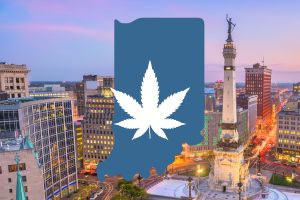Is Hemp Legal in Indiana?
Posted by Tweedle Farms on May 17th 2021

Unraveling the Legality of Hemp in Indiana: Insights for Stakeholders and Consumers
The landscape of hemp legality in Indiana has evolved significantly over recent years, mirroring a broader national shift towards recognizing and harnessing the potential of hemp and its derivatives, such as hemp flower, CBG flower, and CBD oils. This article aims to provide a comprehensive overview of the current legal status of hemp in Indiana, addressing critical considerations for industry stakeholders and consumers alike.
The Legal Framework of Hemp in Indiana
Indiana's journey with hemp began to take a significant turn with the passage of Senate Bill 516 in 2019, which aligned state legislation with the 2018 Federal Farm Bill. This pivotal legislation established the Indiana Hemp Plan, under which hemp could be legally cultivated, processed, and sold, provided it contained less than 0.3% THC on a dry weight basis. This move marked a departure from previous restrictions, opening avenues for agricultural innovation and commercial opportunities in the hemp sector.
Distinguishing Hemp, CBD Flower, CBG Flower, and THCA Flower
• Hemp Flower: Refers to the flower or bud of the hemp plant, which is legally distinguished by its THC content of less than 0.3%.
• CBD Flower: This is hemp flower specifically bred for high cannabidiol (CBD) content. It’s most often used as an inhalable product.
• CBG Flower: Like CBD flower, this is a type of hemp flower bred for its high cannabigerol (CBG) content, and is most often used as an inhalable product.
• THCA Flower: This is a distinction used as a marketing tactic to sell THC-rich cannabis within the hemp program.
Regulatory Compliance and Oversight in Indiana
The Office of the Indiana State Chemist (OISC) oversees the regulation of hemp production in the state, ensuring compliance with both state and federal laws. This includes licensing for growers and processors, as well as strict adherence to testing protocols to confirm THC levels remain within legal limits. This regulatory environment aims to foster a safe and robust hemp industry, ensuring product safety and legal compliance.
Perspectives from the Indiana Hemp Industry
For those engaged in Indiana's rapidly growing hemp industry, the state's regulatory framework presents both opportunities and challenges. While the legalization of hemp has unlocked new potentials for economic growth and diversification in agriculture, navigating the intricate web of regulations and market dynamics requires diligence, innovation, and strategic foresight.
Consumer Access and Awareness in Indiana
With the legal status of hemp solidified in Indiana, consumers have seen an expansion in the availability of hemp-derived products, including CBD oils, pre rolls, topicals, and even dietary supplements like CBD capsules. However, this increased access underscores the importance of consumer education and awareness, particularly regarding product quality, legal compliance, and the differences between hemp-derived CBD and other cannabis products.
Navigating Challenges and Seizing Opportunities
Despite the favorable legal landscape, Indiana's hemp industry faces ongoing challenges, including regulatory fluctuations, market saturation, and the need for continuous research and development. Addressing these challenges head-on, through industry collaboration, consumer education, and advocacy for supportive policies, will be key to sustaining and growing the hemp sector in Indiana.
Future Outlook: The Evolution of Hemp Legislation and Market Trends in Indiana
As the hemp industry in Indiana matures, those in the industry can anticipate ongoing developments in legislation, market trends, and consumer preferences. Staying informed and engaged with these changes will be vital for businesses and consumers alike, ensuring that Indiana's hemp industry remains vibrant, compliant, and innovative.
Conclusion: Indiana's Hemp Industry—A Collaborative Path Forward
Indiana's approach to hemp legalization and regulation marks a significant step forward in acknowledging the crop's economic and therapeutic potential. For industry stakeholders, navigating this landscape requires a thorough understanding of regulatory nuances and market dynamics. For consumers, making informed choices about hemp-derived products is essential for ensuring safety and efficacy. As Indiana continues to refine its hemp policies, the collective efforts of regulators, businesses, and consumers will shape the future of the industry, promising economic opportunities and new wellness solutions.



